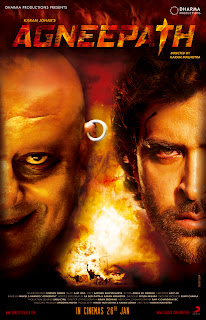Agneepath (2012, India, Karan Malhotra)
Karan Malhotra’s Agneepath conveys the essence of 1980's Bollywood revenge tales in a technically sharp framework that smartly uses silence when needed and in other moments, confidently lets the heightened background score serve as an emotional guide. The end result is that Malhotra’s film is a completely different beast from Mukul Anand’s 1990 Agneepath. The 2012 film cannot be called a remake by any standards and is a true homage as noted by producer Karan Johar at the start of the film. Karan Johar’s father, Yash Johar, was the producer of the original film so understandably Karan wanted to do his father proud and that is exactly what the entire team of the 2012 film have achieved.
Of course, doing a scene-by-scene remake of the original film would have been an impossible task because the 1990 film was powered by a riveting performance by Amitabh Bachchan who channeled the voice of Marlon Brando’s Vito Corleone (Godfather) in his portrayal of Vijay Dinanath Chavan. There were many memorable characters in Mukul Anand’s film but none towered over Amitabh's character. However, in Malhotra’s film the character of Vijay (played by Hrithik Roshan) does not displace the other characters as Roshan turns the anger of the original character inward and hides his burning revenge quite nicely. Instead, it is the two villains in Malhotra’s film who manage to steal the show.
Kancha & Rauf Lala
Sanjay Dutt plays the drug lord Kancha, a behemoth monster, whose appearance terrifies those around him. In fact, he is so terrifying that even he is afraid of his own reflection. His fear has roots in his childhood when he was picked on by other kids for his ugly appearance and whenever Kancha looks at a mirror, he is transported back to his painful past. In two instances in the film, Kancha smashes a mirror which dares show him his face. A mirror is his weak point much like fire was Anna’s (Nana Patekar) in Parinda. In Vidhu Vinod Chopra’s classic 1990 film, Anna was a fierce gangster whose childhood fear of fire was his ultimate undoing. In Agneepath, Vijay is not privy to the knowledge of Kancha’s weakness and is unable to use a mirror to defeat Kancha.
Kancha quotes the Gita in a similar manner to Manoj Bhajpai’s character from Aks but overall he appears to be a cartoonish villain much like Amrish Puri’s Mogambo from Mr. India. Therefore, the responsibility of portraying pure evil falls to Rishi Kapoor, an actor not known for playing a negative character.
Rishi Kapoor’s ruthless portrayal of Rauf Lala comes as a real surprize given the warm loving characters that Kapoor has played in the past. Yet, Rishi Kapoor is able to extract enough charm from his past characters and transform it into the sinister Rauf Lala who appears to be trustworthy when needed and is ruthless when he wants to eliminate his enemies. He also does not expose his true emotions to those around him, including his own son. In a key moment in the film, Rauf's son is surprized when Lala drops a hint that one day the trusted Vijay will be bumped off. Rauf Lala delivers these lines while smiling and lovingly waving at Vijay. Many ruthless villains often compromise or grovel in their final moments but Rauf Lala is evil until his last breath and manages to unleash the violent animal inside of Vijay. Vijay does not want to resort to pure violence but Rauf Lala incites him. This incitement echoes a famous scene from Priyadarshan’s Virasat when Anil Kapoor’s character of Shakti Thakur asks his opponent to back off because Shakti does not want to become a "janwar" (animal) like his opponent. But when his opponent does not back down, Shakti has no choice but to resort to ultimate violence.
The Indian film industry has seen an incredible range of villains from Gabbar (Amjad Khan in Sholay) to Anna (Nana Patekar in Parinda) to Bhiku Mhatre (Manoj Bajpai in Satya) that it is hard to imagine that anyone could add a new dimension in portraying a gangster. Therefore, full credit to Rishi Kapoor for carving out a unique persona with his portrayal of Rauf Lala.
Finally....
Katrina Kaif nails the "Chikni Chameli" song.
The song is not required in the film but Kaif’s energetic & technically perfect performance ensures that the song keeps up the frenzied tempo of the film. The song itself manages to evoke elements from three other memorable Bollywood numbers -- "Beedi" (Omkara), "Humko Aajkal" (Madhuri Dixit in Sailaab) and "Jumma Chumma De De" (Hum).




No comments:
Post a Comment